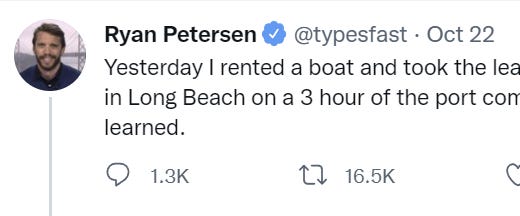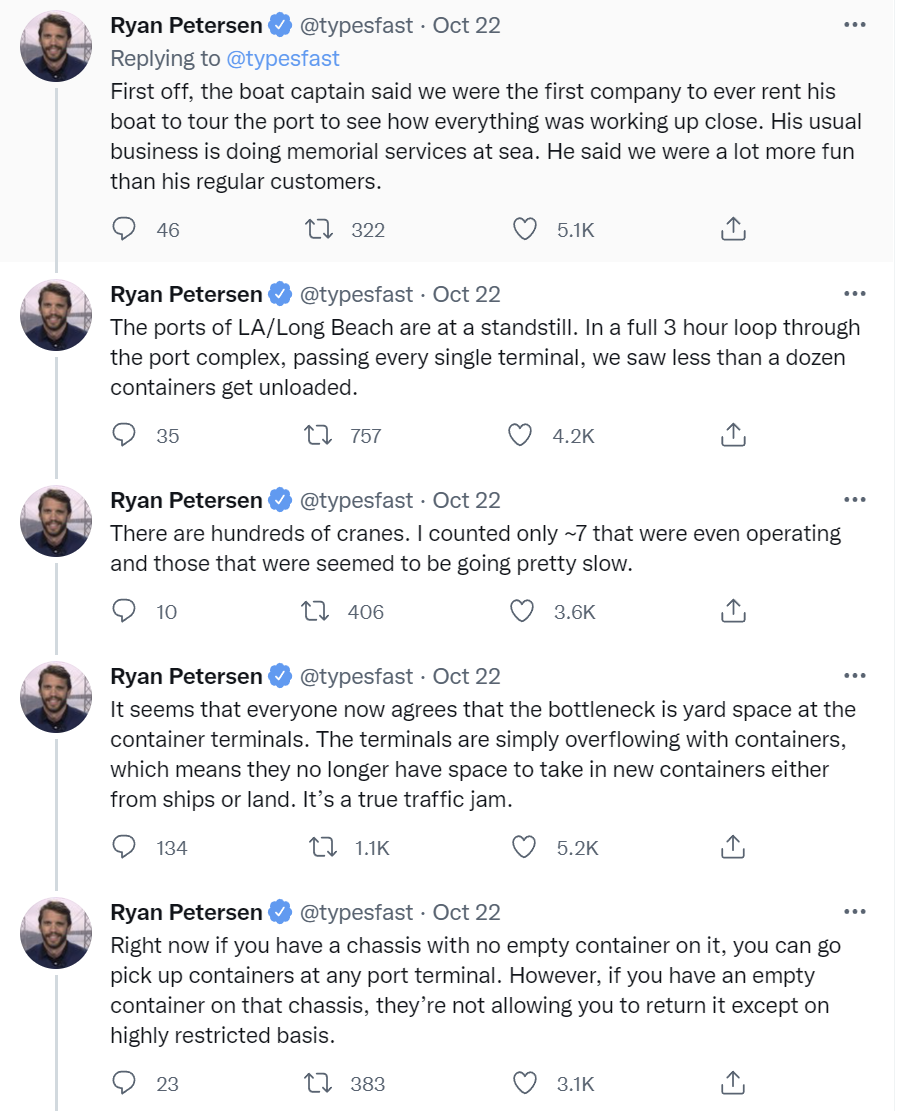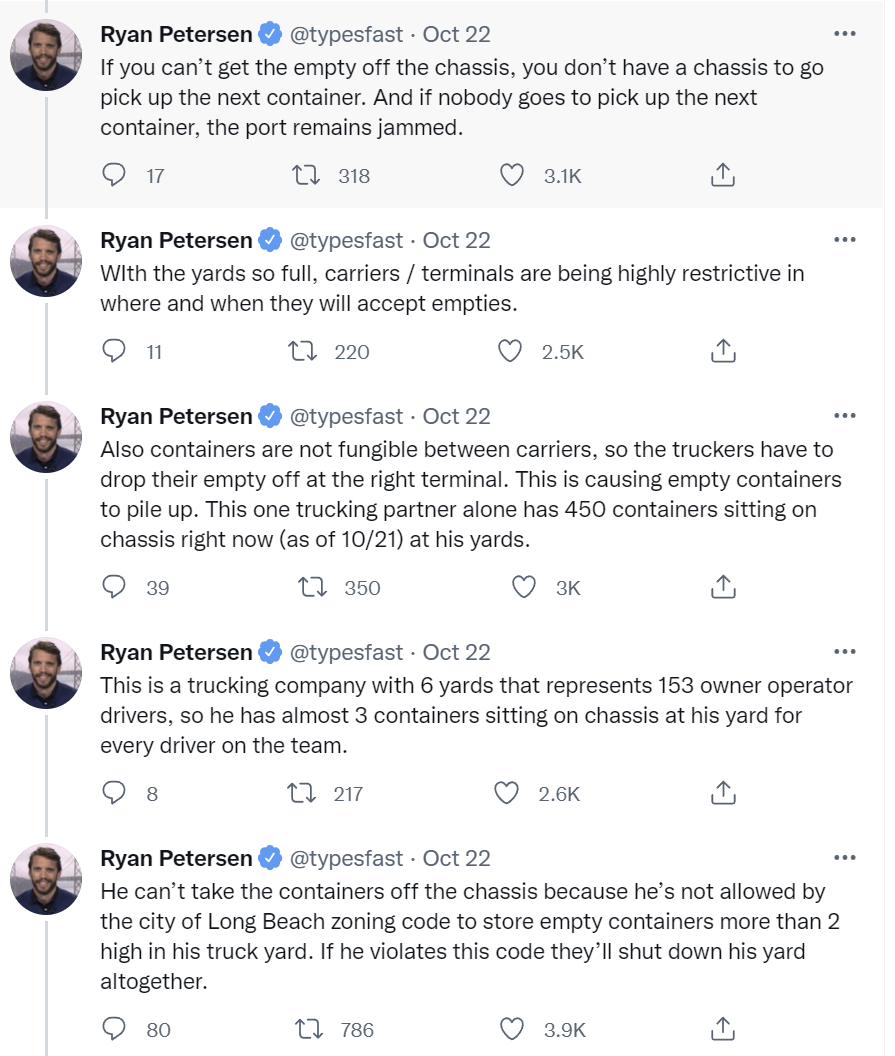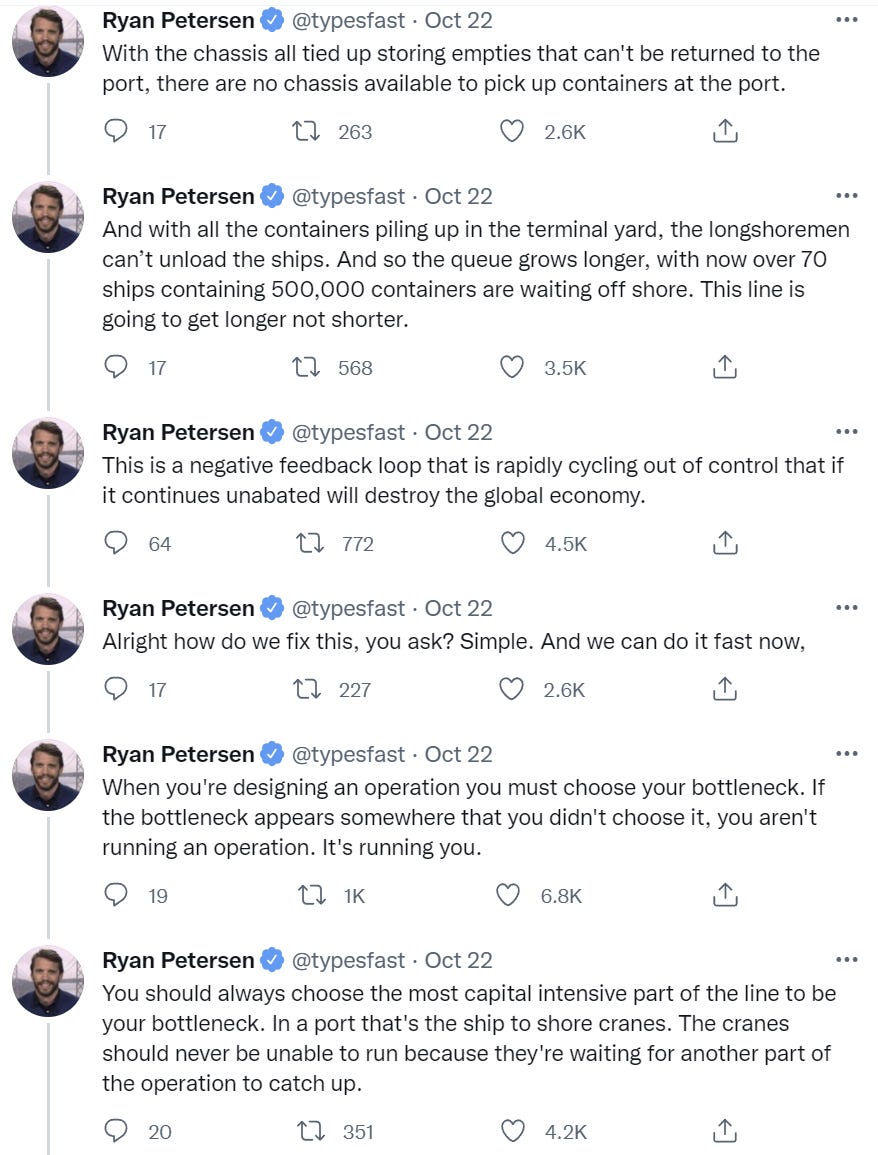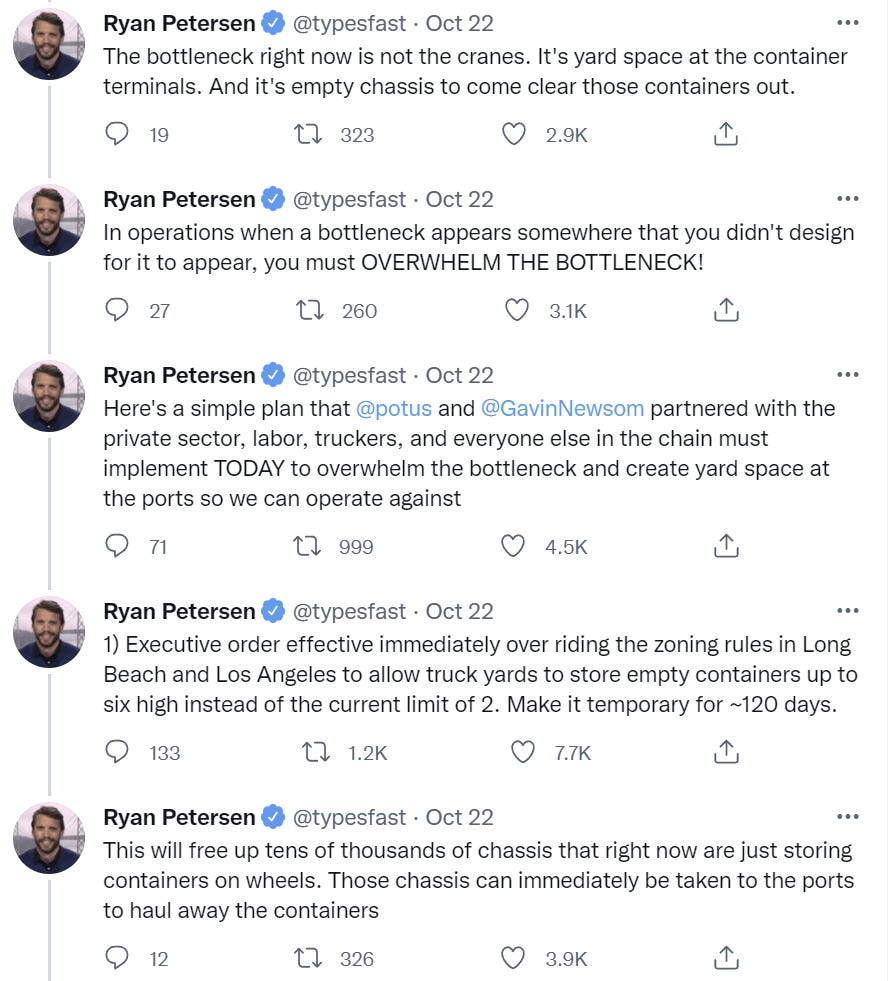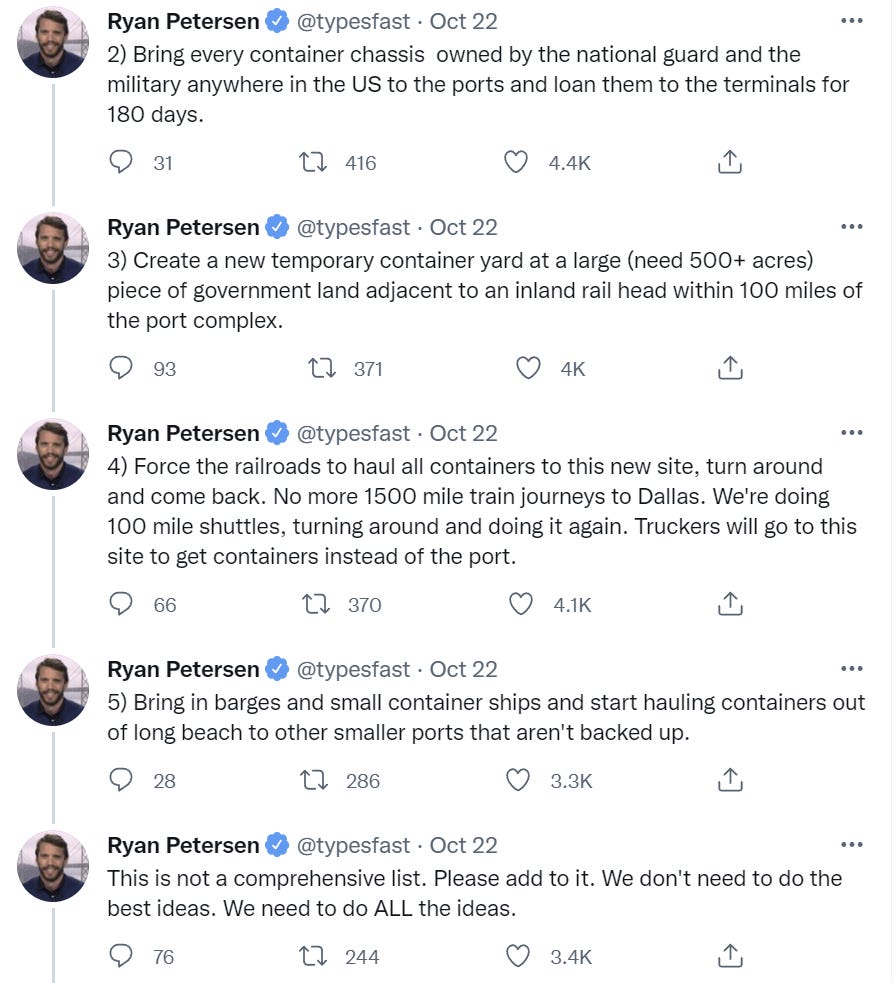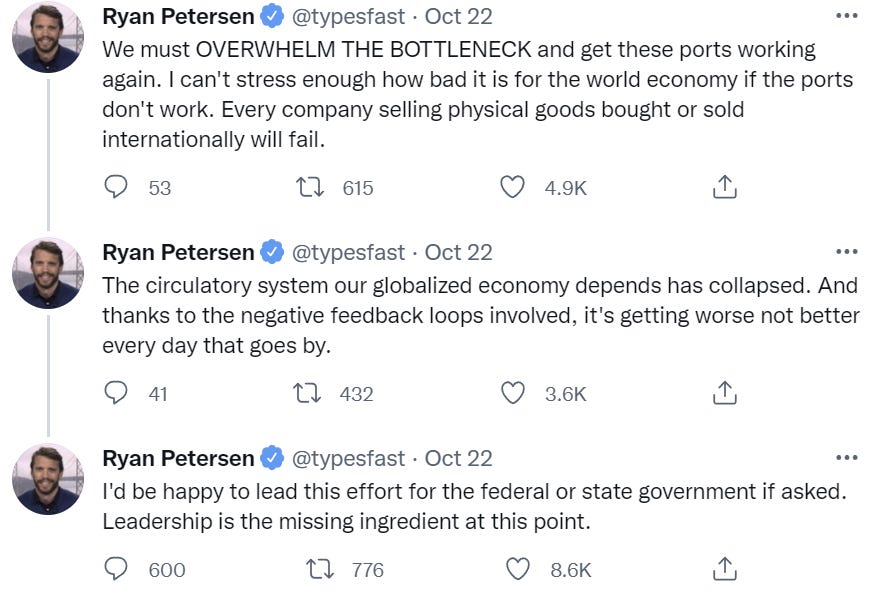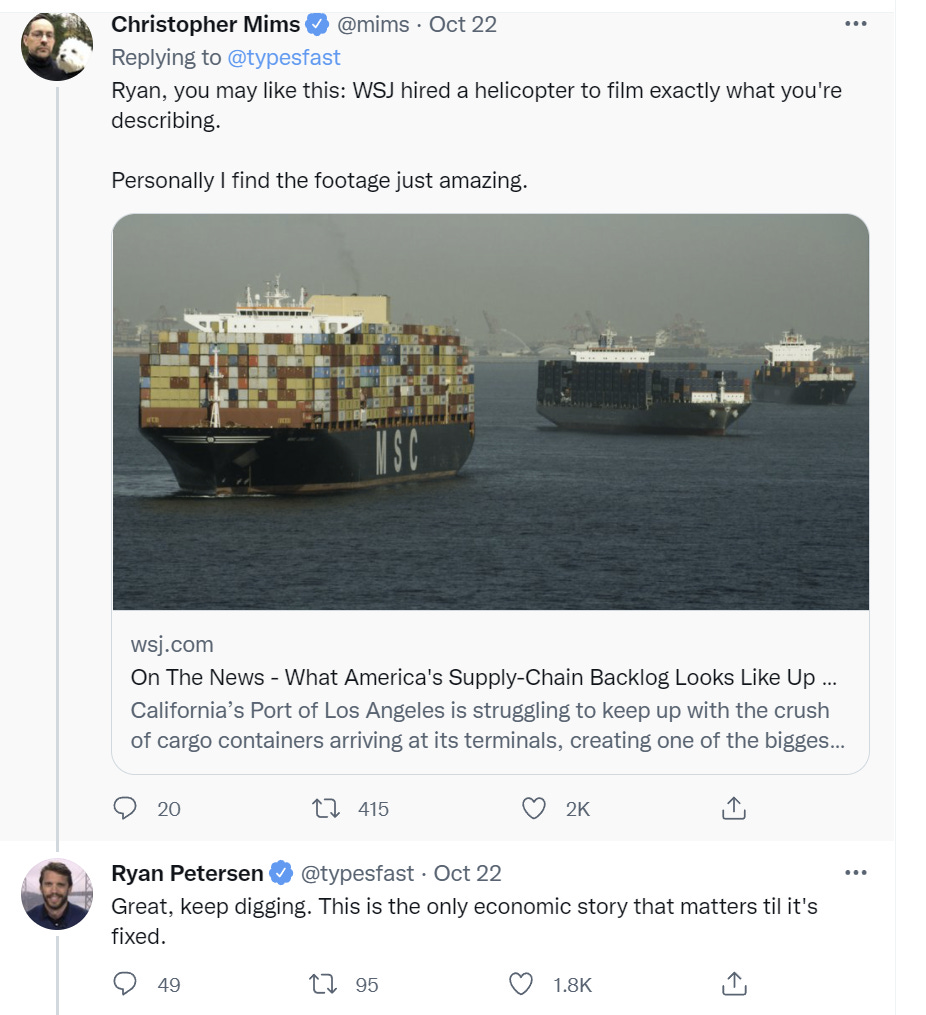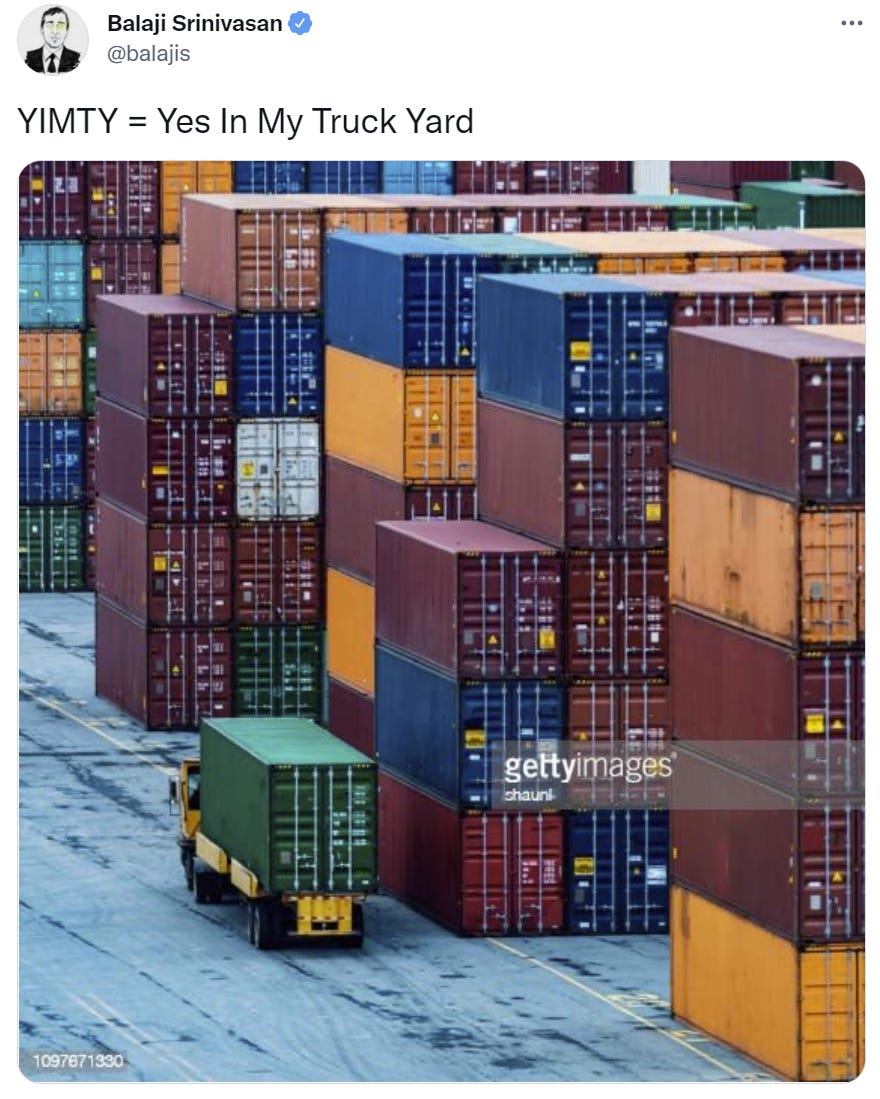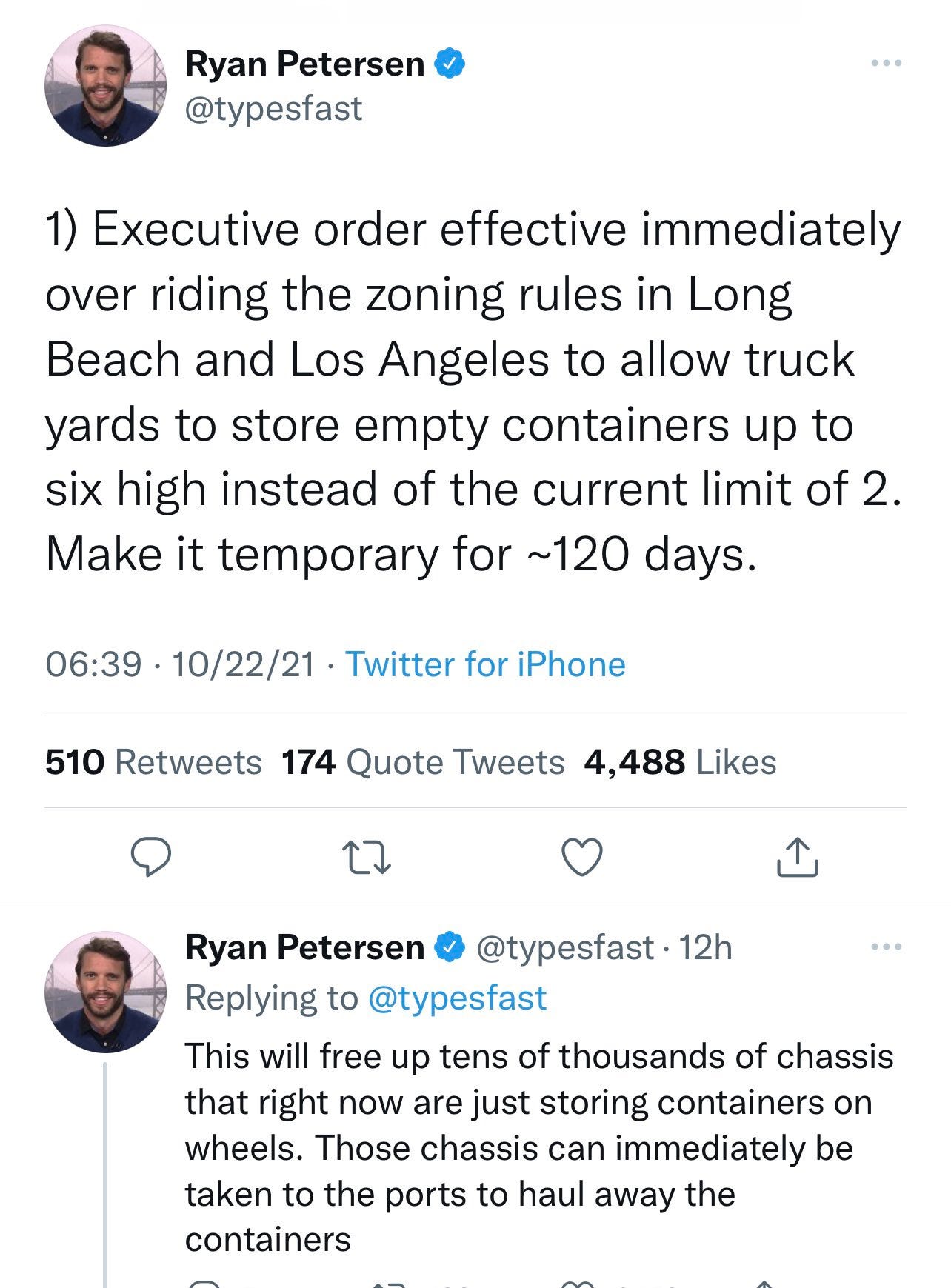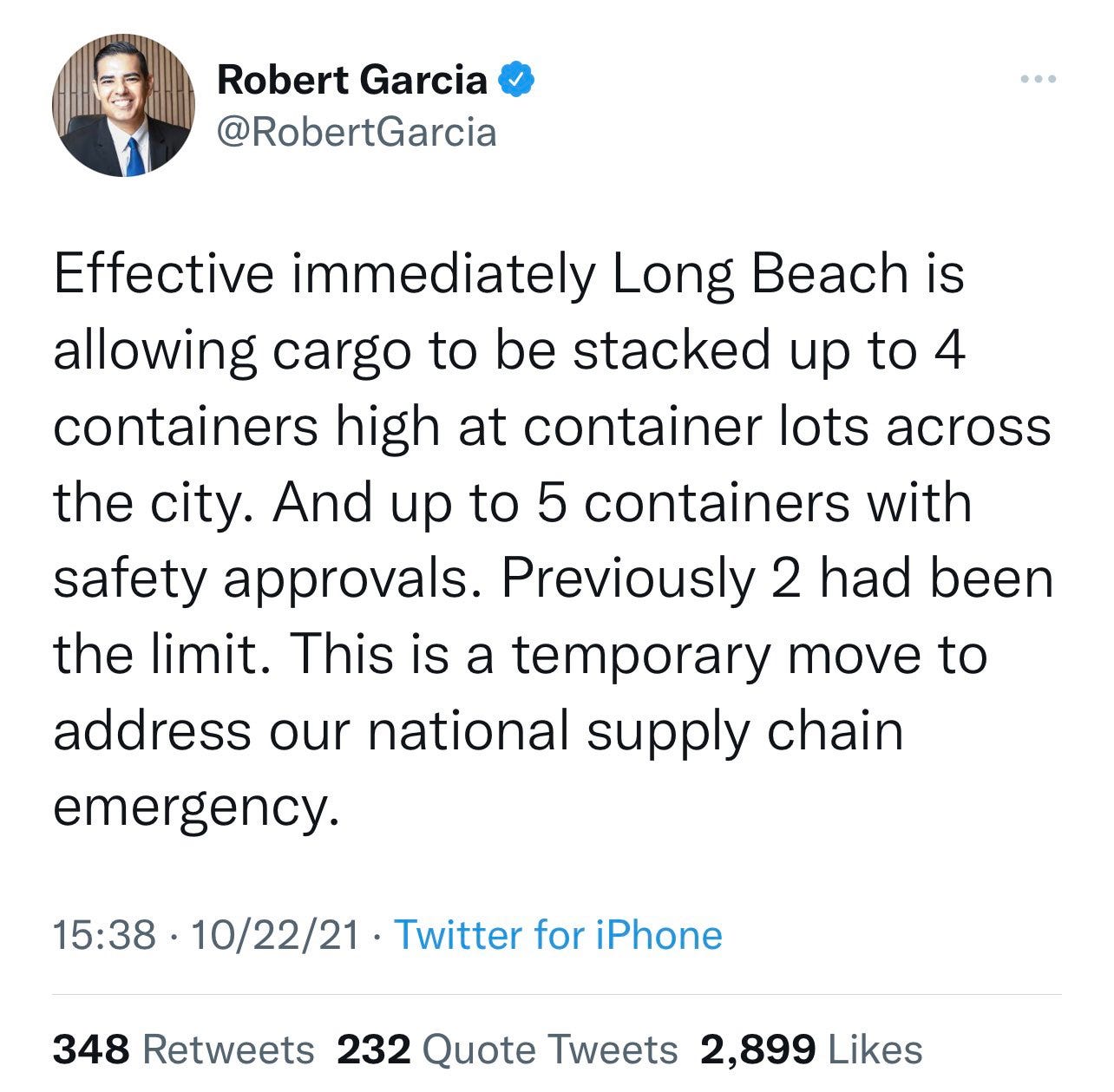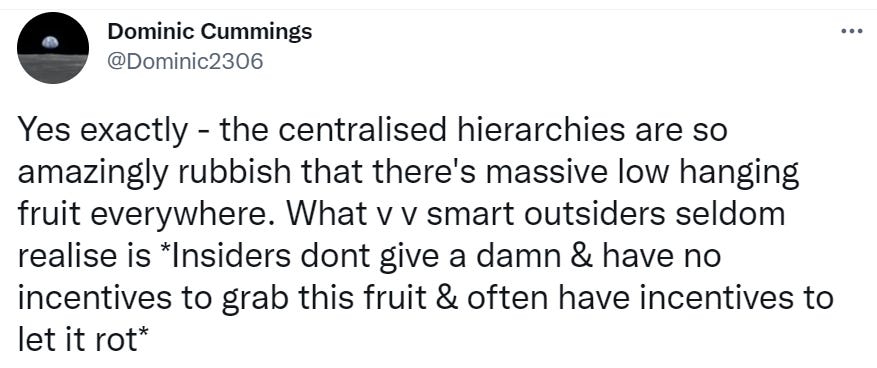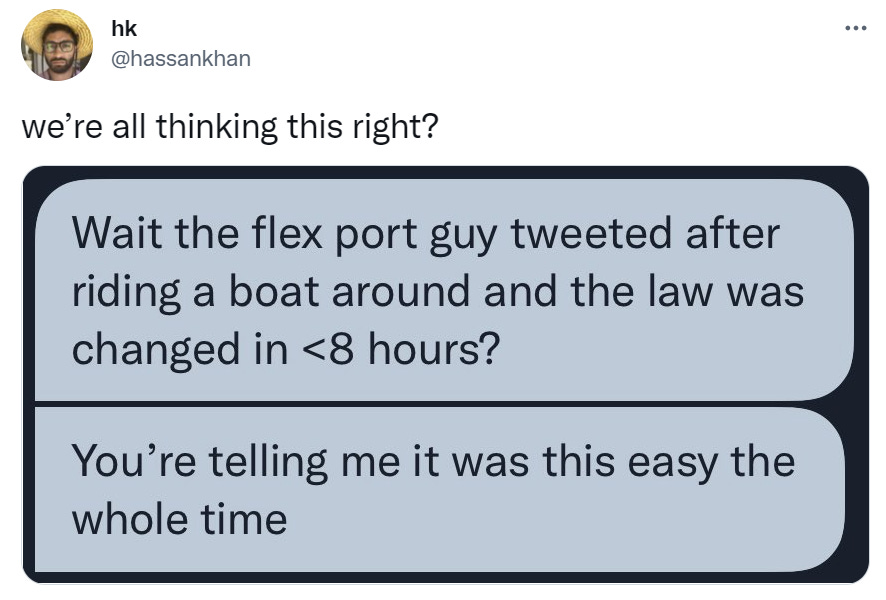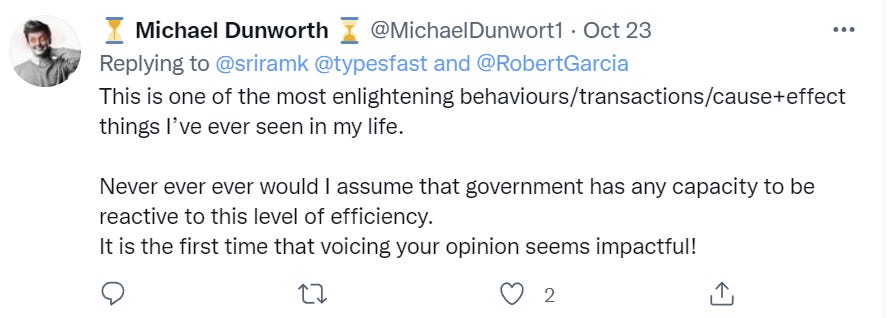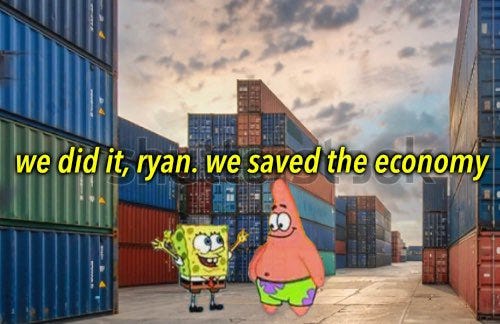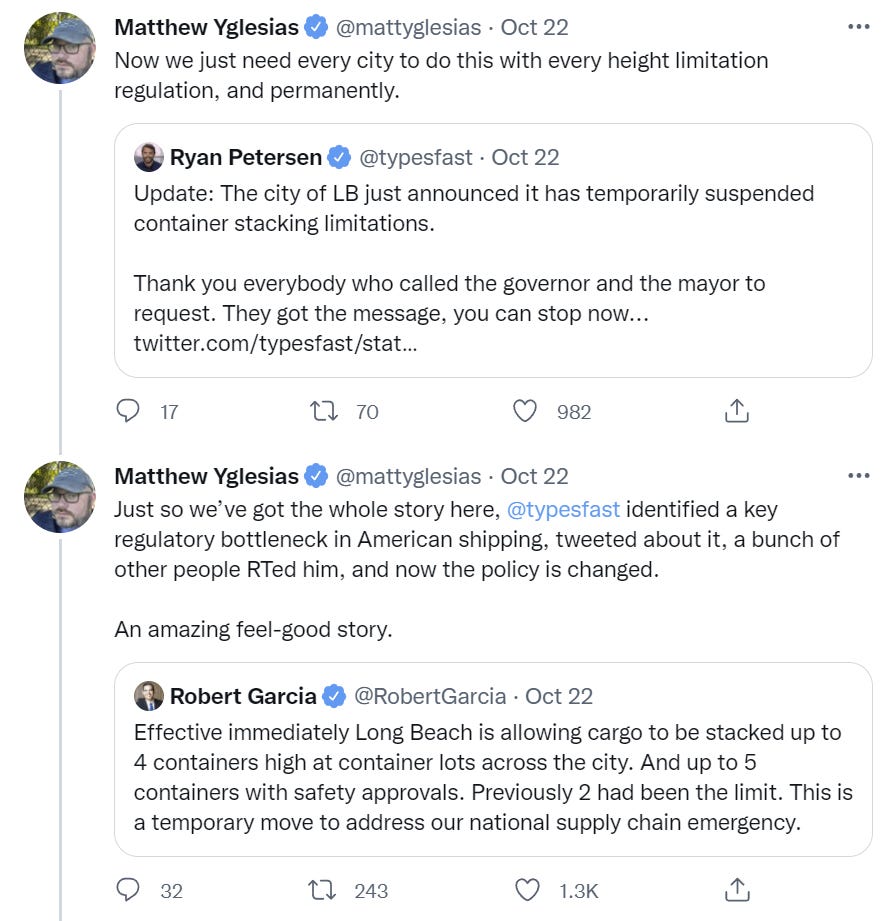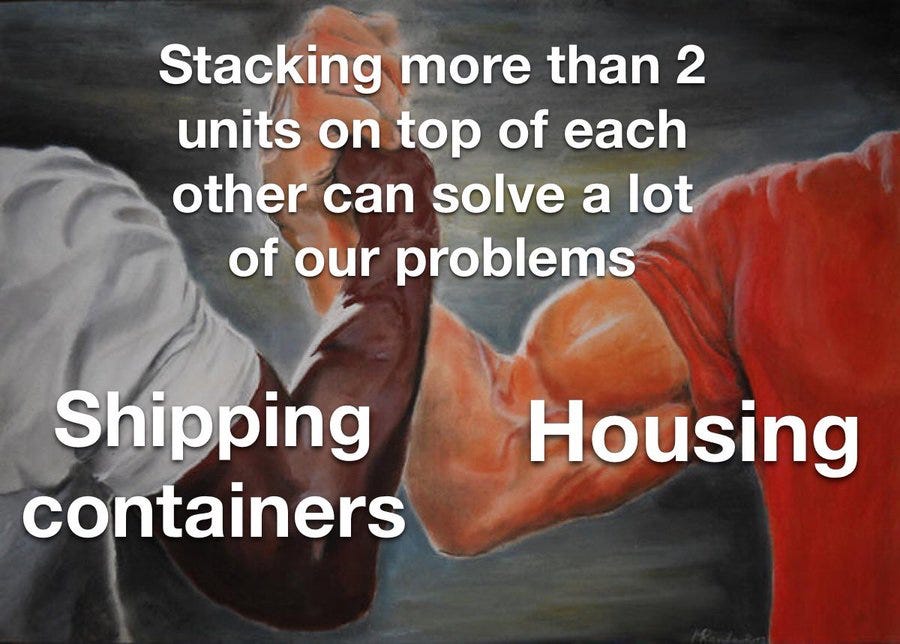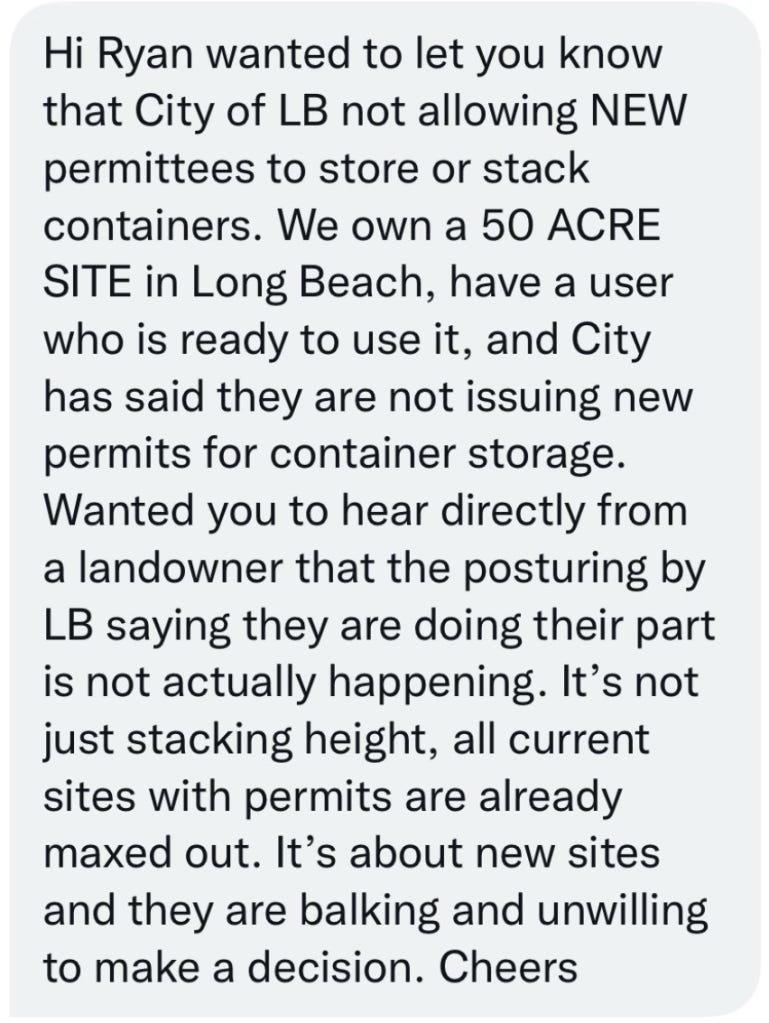An Unexpected Victory: Container Stacking at the Port of Long Beach
A miracle occurred this week. Everyone I have talked to about it, myself included, is shocked that it happened. It's important to
Understand what happened.
Make sure everyone knows it happened.
Understand how and why it happened.
Understand how we might cause it to happen again.
Update our models and actions.
Ideally make this a turning point to save civilization.
That last one is a bit of a stretch goal, but I am being fully serious. If you're not terrified that the United States is a dead player, you haven't been paying attention - the whole reason this is a miracle, and that it shocked so many people, is that we didn't think the system was capable of noticing a stupid, massively destructive rule with no non-trivial benefits and no defenders and scrapping it, certainly not within a day. If your model did expect it, I'm very curious to know how that is possible, and how you explain the years 2020 and 2021.
Here's my understanding of what happened. First, the setup.
The Ports of Los Angeles and Long Beach together are responsible for a huge percentage of shipping into the Western United States.
There was a rule in the Port saying you could only stack shipping containers two containers high.
This is despite the whole point of shipping containers being to stack them on top of each other so you can have a container ship.
This rule was created, and I am not making this up, because it was decided that higher stacks were not sufficiently aesthetically pleasing.
If you violated this rule, you lost your right to operate at the port.
In normal times, this was annoying but not a huge deal.
Thanks to Covid-19, there was increased demand to ship containers, creating more empty containers, and less throughput to remove those containers.
Normally one would settle this by changing prices, but for various reasons we won't get into price mechanisms aren't working properly to fix supply shortages.
Trucking companies started accumulating empty containers.
The companies ran out of room to store the containers, because in many places they could only stack them in stacks of two, and there was no practical way to move the containers off-site.
Trucks were forced to sit there with empty containers rather than hauling freight.
This made all the problems worse, in a downward spiral, resulting in a standstill throughout the port.
This was big enough to threaten the entire supply chain, and with it the economy, at least of the Western United States and potentially of the whole world via cascading problems. And similar problems are likely happening elsewhere.
Everyone in the port, or at least a lot of them, knew this was happening.
None of those people managed to do anything about the rule, or even get word out about the rule. No reporters wrote up news reports. No one was calling for a fix. The supply chain problems kept getting worse and mostly everyone agreed not to talk about it much and hope it would go away.
A bureaucrat insisting that stacked containers are an eyesore, causing freight to pile up because trucks are stuck sitting on empty containers, thus causing a cascading failure that destroys supply lines and brings down the economy. That certainly sounds like something that was in an early draft of Atlas Shrugged but got crossed out as too preposterous for anyone to take seriously.
Then our hero enters, and decides to coordinate and plan a persuasion campaign to get the rule changed. Here's how I think this went down.
He in advance arranges for various sources to give him a signal boost when the time comes, in various ways.
He designs the message for a format that will have maximum reach and be maximally persuasive.
This takes the form of an easy to tell physical story, that he pretends to have only discovered now.
Since all actual public discourse now takes place on Twitter, it takes the form of a Twitter thread, which I will reproduce here in full.
It's long, but this is a super important Twitter thread, and I strongly recommend you read the whole thing, noting that I am confident Ryan Peterson knew a lot of this before he took the boat ride:
That initial tweet got 16k retweets and 33k likes, and even the others got thousands of likes as well, so this successfully got many people's attention. It's worth paying attention to the details here, as this was crafted in order to spread and be persuasive, and also not crafted to make people angry or to blame anyone. It's a call to positive action. In particular, I notice these characteristics:
Starts with a relatable physical story of a boat ride, and a friendly tone.
Tells a (mostly manufactured) story that implies (without saying anything false) how the ride led him to figure these things out, which gives rhetorical cover to everyone else for not knowing about or talking about the problem. We can all decide to pretend this was discovered today.
Then he invokes social consensus by saying that 'everyone agrees' that the bottleneck is yard space. Which is true, as far as I can tell, everyone did agree on that. Which of course implies that everyone also knows there is a bottleneck, and that the port is backed up, and why this is happening. The hidden question of why no one is doing much about this is deflected by starting off pretending (to pretend?) that the boat ride uncovered the problem.
Describes a clear physical problem that everyone can understand, in simple terms that everyone can understand but that don't talk down to anyone. He makes this look easy. It is not easy, it is hard.
Makes clear that the problem will only get worse on its own, not better, for reasons that are easy to understand.
Makes clear the scope of the problem. Port of Long Beach effectively shuts down, we can't ship stuff, potential global economic collapse. Not clear that it would be anything like that bad, but it could be.
Gives a decision principle that's simple, a good slogan and again can be understood by everyone, and that doesn't have any obvious objections: Overwhelm the bottleneck.
Gives a shovel-ready solution on how to begin to overwhelm the bottleneck, at zero cost, by allowing containers to stack more.
Gives more shovel-ready solutions on top of that, so that (A) someone might go and do some of those as well, (B) someone can do the first easy thing and look like it's some sort of compromise because they didn't do the other things, (C) encourage others to come up with more ideas and have a conversation and actually physically think about the problem and (D) make it clear the focus is on finding solutions and solving problems, and not on which monkey gets the credit banana.
Makes it clear solutions are non-rivalrous. We can do all of them, and should, but also do any one of them now.
Gives a sense of urgency, and also a promise of things getting better right away. Not only can you act today, Sir, you are blameworthy tomorrow if you do not act, and you will see results and rewards tomorrow if you do act. Not only reactions to the announcements, physical results on the ground. That's powerful stuff.
Ends by noting that leadership is what is missing. You could be leadership and demonstrate you're a good leader, or you can not do that and demonstrate the opposite. Whoever solves this is the leader.
The whole scenario is maximally designed to facilitate persuasion and action. Clear physical problem, clear physical solution, clear authority to implement it, no drawbacks, no losers, no cost, no associations with sensitive topics or unfortunate implications from any direction, it's all good, you can simply do the thing and the thing is done and things are better, that's it, no really, that's it.
Despite this, again, no one I've talked to about this expected the problem to be fixed.
I didn't see anyone posting something afterwards along the lines of 'yes of course we lifted that restriction now that this has been pointed out.' I certainly didn't see anyone say 'and of course now we should expect this to be fixed since it's so obvious.' I didn't even see a sarcastic version of that. This is the most optimistic take I could find.
But this definitely happened. Presto.
Thus, we have a long list here of reasons why this was unusually low hanging fruit, but all these known factors combined were not sufficient to create any predictions or expectations that it would work, even with hindsight. Everyone noticed they were confused.
Celebrate, good times, come on:
Less than eight hours is mind-boggling efficiency. First the information has to be noticed and brought to the attention of the relevant authority, who then has to confirm that they have the authority to make the change, and do the whole Chesterson's Fence investigation to figure out why the rule exists, and also confirm that the change is safe and write the new rule, and implement it. If you can do it much faster than this while being responsible about it, it less says that you're super efficient and more raises once again the question of why it wasn't done already.
The housing metaphor is obvious and correct and apt, and in terms of benefits it's also very low hanging fruit, but the opposition is far stronger and better motivated, so it's not obviously the best next target once we finish fixing shipping. Even further improving shipping with similar improvements, of which there are doubtless many available, would still be surprising. All the other stuff on Ryan's list, or other ideas that could help expand shipping? I don't see any signs of any of that moving forward.
Even this simple change wasn't fully implemented. Los Angeles, despite the example from Long Beach, never implemented the change. And in Long Beach, yes they allowed more stacking at existing sites, but that doesn't mean our problems are over...
The change helped a non-zero amount, but only in Long Beach, and now it's on to the next bottleneck, the next place action is needed and isn't happening.
A wild idea that I haven't heard proposed, which won't solve our short term problems but does seem like a good idea, is how about we create a new port? If I asked you exactly where not to try and hire a bunch of people and especially not to drive a truck away from efficiently, and also to not try to expand into more space and capacity for the future, in all the Western part of the land, I'm pretty sure that my two answers would have been Los Angeles and San Francisco. Not that they are bad places for ports, but they're where all the people and high prices and land scarcity and traffic are right now. Having all our stuff start out in those places might not be the best move. And ideally doing things elsewhere would make various barriers easier to overcome, although I fear trying to build a new thing now even in a new place would be time and cost prohibitive. But at this stage there are no bad ideas.
The focus in the short term should clearly be, all right, we made some progress on the first bottleneck. Now we need to make more progress, such as by getting Los Angeles to make the change and get faster permitting of new lots. We also should look to find the next solution for the bottleneck, and for the next bottleneck. There are some concrete suggestions on that in Ryan's thread, but I don't see any attempts to get further traction along those lines. Which of course is fully expected, but we didn't expect to get the first most important thing, so who knows what is possible?
Momentum now seems like it would be incredibly valuable. If people started thinking that we could change stupid rules and do physical things, there's treasure everywhere, and the more that kind of thing happens the more we would get ambitious enough to try things and overturn restrictions that are less obvious and where we face more resistance. The best case scenario endgame here is to start acting like live players again, and that would be quite the win.
The first step is to get the word out. Shout it from the rooftops, as it were, that we as a nation did a thing, and a thing is a thing we can do, because One Man stood up and was heard. It's big news. The people need to know.
And yet, the people do not know. I found a Washington Post article, and it is quite good, but it wasn't easy for me to find. If you need to share one piece that explains what happens, this is very good for that, because it is a Proper Authority and tells the real story, including that the rule was there because stacks were considered too ugly. This is an example of how one is supposed to report such things.
The only other mainstream posts I could find on a search were this from Bloomberg and this one from CBS. These are the opposite, and almost read like a cover-up. They note that the stacking limit has been eased, but says nothing about how that came to be, or why the rule was there in the first place, or how big a deal this is. They don't tell people the news that matters most.
It's still better than actual nothing. When I ran searches elsewhere on particular sites, after trying a general search that didn't find much either, I got nothing. CNN has this report about how the governor issued executive orders that didn't do anything to help, but from what I could see nothing about the stacking restriction. Fox News has nothing. As an experiment I looked at New York Times and nothing came up. That doesn't mean I know for sure that such sources had no coverage at all, but it does mean that when I went explicitly looking for such coverage, even with site-specific searches, I still could not find it from such sources. If you know of any other coverage, especially good coverage, please share it in the comments. Given how easy it was to miss the Washington Post article, I am hopeful that there is more that I have not found.
My going theory on why the news isn't being shared is because it is being instinctively suppressed by the implicit forces that filter out such actions from the official narratives. The whole scenario might give people the idea that we could do things because they're helpful. It gives status to someone for being helpful. It highlights our general failure to do helpful things, and plausibly blames all our supply chain (and also plausibly all our civilizational) problems on stupid pointless rules and a failure to do obviously correct things. That's not a good look for power, and doesn't help anyone's narratives, so every step of the way such things get silenced.
We need to not let this happen. People need to remember what happened here, at the Port of Long Beach.
To wrap up, my top model updates are:
We are capable of actually acting fast and correctly when circumstances are right.
Acting in a way that's designed to work, and be persuasive, actually works.
A single person can, under the right circumstances, cause such action.
Another single person can, often, if sufficiently motivated, implement the change.
The low hanging fruit is even lower hanging and more valuable than it looks, even after all previous adjustments for this.
Even when such big news happens, it will be ignored, so it's on us to spread the good word, and to find ways to do this again.
We do still have to check in all such cases, to see what was actually implemented and whether it worked. Otherwise we can't update, and it will be too tempting to say you're going to fix something and then do nothing.
Anyone have a good idea for a next target?
EDIT 11/12: This post has been updated to reflect new information about the extent of the impact of what happened. The section about how much the word got out has not been updated, however, as it reflects the situation at the time, despite news having gotten out somewhat more after the post was written.
If you want to continue reading my thoughts on this, I did a follow up post here.
